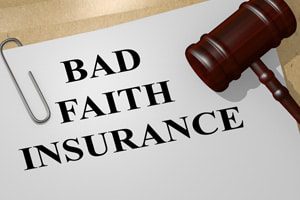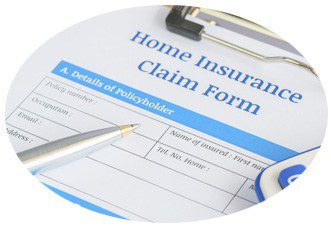
How to Ensure That You Receive Full Compensation for Your Hurricane Property Claim If you have endured the chaos of a Hurricane, you have seen firsthand that hurricanes constitute one of the most destructive natural disasters that families and their homes can experience. When you purchased homeowners insurance, you probably assumed that your insurance […]

If you have endured the chaos of a Hurricane, you have seen firsthand that hurricanes constitute one of the most destructive natural disasters that families and their homes can experience. When you purchased homeowners insurance, you probably assumed that your insurance carrier would provide financial security from severe property damage and the potentially ruinous costs of repair. Despite your reasonable assumption, insurers often leave policyholders in the lurch by denying or undervaluing claims in bad faith or based on minor technicalities. Disappointed policyholders can challenge insurance claim denials by filing a breach of contract and bad faith lawsuits to obtain benefits under their policies, along with other appropriate damages.
In areas that suffered the most devastation when Hurricane Michael hit Florida on October 10, 2018, over 150,000 insurance claims were filed. Homeowners who suffered massive losses felt that they were being victimized for the second time when their insurer refused to honor their promises. Long delays and low offers were common. According to the Florida Office of Insurance Regulation (FOIR), 23% of commercial claims and 14% of residential claims were closed without any payment at all. Our attorneys who understand the pain and mental anguish that a hurricane can cause felt the failure of insurance companies to pay Hurricane Michael claims in a fair and timely manner was egregious. Aggrieved policyholders have found relief and comfort in the efforts of Parker Waichman LLP to compel their insurers to pay their claim or file an insurance bad faith lawsuit.
Hurricanes are no surprise in Florida: Hurricane Irma had caused substantial damage the year before Michael. This has caused chaos among insurers. As the Wall Street Journal has explained, “Florida is an oddball insurance market for homeowners.” The large national carriers largely left the state after Hurricane Andrew, so they do not dominate as they do in many states. Florida is served by many small-to-midsize insurance carriers, which generally do not have the capital of larger insurers. They have to depend on reinsurers to fund claims, slowing down the process and sometimes leading to disputes over coverage.
While some people attempt to compare situations with friends and neighbors to determine if their insurer’s denial or “lowball” offer merits a lawsuit, policy terms, the scope of coverage, and factual scenarios can differ in subtle ways. Policyholders will be best served by speaking with an experienced insurance bad faith lawyer in Florida. The attorney can analyze the damage to your home, consult with experienced insurance adjusters and experts, and determine the optimum strategy for obtaining reimbursement for your property damage and other losses.

The principal objective for homeowners who file an insurance claim in the wake of a tropical storm or hurricane is to obtain the financial protection promised by their insurance policy. Although an insured can file a complaint or even a lawsuit without an attorney, insurance carriers recognize they have a huge advantage against an individual insured. The basis of this power imbalance includes teams of insurance adjusters, insurance defense lawyers, appraisers, experts, and a virtually endless wealth of litigation resources. Insurance companies often leverage these inherent advantages and even engage in bad faith practices to force homeowners to settle for less than the value of their claim.
Experienced hurricane insurance claims attorneys push insurance carriers to provide a specific rationale for denying a claim along with relevant policy language. Our law firm negotiates tenaciously with the insurance company while utilizing experts to analyze the nature of the property damage and appropriate remedial measures. We represent clients when their insurance company refuses to conduct a proper investigation and evaluation of their claim in a reasonably timely manner or to pay the full value of their claim. Our homeowners’ insurance dispute lawyers also carefully evaluate the conduct of the insurance carrier in breaching the insurance contract to identify bad faith practices that might entitle you to receive compensation for losses beyond contract damages. While each law firm has different billing practices, Parker Waichman LLP routinely handles these cases on a contingency fee basis arrangement, which means you only owe attorney fees if we obtain a recovery. We also advance the costs of litigation, which includes the filing fees when we initiate your lawsuit.
If you have faithfully paid premiums to your homeowners’ insurance carrier for years, you might be shocked when your insurer does not promptly resolve your claim in the wake of a hurricane. While filing a claim with your insurance carrier is the first step in the process of pursuing benefits under your policy, the process can be long and convoluted. Filing your claim can be complicated because typical homeowners policies do not cover damage from flooding, so you need to ensure that your policy has a special windstorm endorsement and the types of losses that are covered. Separate claims will need to be filed based on the types of losses experienced.
The insurance company will respond by sending an adjuster to evaluate the damage, but this process can be slower than desirable because insurers receive so many claims after a hurricane. Experienced Florida insurance claims dispute attorneys can often assist clients in speeding up the process.
If your claim is denied or the insurance company offers inadequate compensation, you must file a dispute with your insurer. Most insurance policies require that disputes be made in writing by the insured. Because insurance carriers often employ delay as a defense strategy to avoid paying a claim, you should file your dispute to the denial, or proposed resolution of your Hurricane Michael claim promptly.
When you are dispute involves the National Flood Insurance Program (NFIP), which is administered by FEMA, you must submit a request for an appeal. If you file a lawsuit, the appeal process will cease. The dispute must be resolved through legal action, which requires knowledge of the legal process, civil court procedures, evidentiary rules, and other complexities of litigation. If you are filing an NFIP claim, you should seek legal advice immediately for advice on how best to proceed.

Florida homeowners routinely have a provision in their policy that mandates they pursue a form of alternative dispute resolution (ADR), such as an appraisal process clause. Disputes with your homeowners’ insurer can arise for many reasons, such as a disagreement over whether the roof needs replacement rather than patching or whether the property damage is the product of the hurricane or a lack of maintenance. This process involves both parties hiring an independent appraiser who reviews the documents and information provided by both parties and conducts his or her own examination of the property. The appraisers will analyze the report of the other appraiser and discuss a potential settlement. If the adjusters cannot reach an agreement, they will consult a third appraiser who serves as an umpire. The umpire will review and analyze all of the information provided by both sides and make a decision about the damage claim.
An insured’s hurricane insurance claims attorney can help select an appraiser, gather evidence and documentation, and steer the policyholder through this process. If you are still dissatisfied, your lawyer can assist you in filing a lawsuit in district court. A Florida insurance claims denial attorney can determine if you have the basis for filing a lawsuit based on breach of contract and/or bad faith and guide you through the complex process of civil litigation.
The intense winds and saturating rain from Hurricane Ian ripped down power lines, damaged roofs, and uprooted trees that fell on homes. The strength of hurricane wind speed usually will determine the extent of the damage incurred. The Saffir-Simpson Wind Scale is used to determine the category of a hurricane according to a rating system of 1 to 5. While a Category 1 can have winds over 74 mph that uproot shallowly rooted trees and cause damage to gutters, shingles, and siding, a Category 4 hurricane can entirely destroy exterior walls and roofs. This more intense type of storm also can uproot utility poles and most trees.
Policyholders need to understand the terms of their policy, which includes policy limits and other important provisions. While standard homeowners policies cover damage caused by wind, for example, they do not extend to flood damage. If wind causes damage to the siding or roof of a home, the damage would be covered. However, damage to the interior of the property from rising water would not fall within the scope of coverage. The typical homeowners’ policy also will require a percentage of the policy limits to be paid as a deductible before benefits are paid under the policy.
Predictably, insurers will often contend that hurricane damage was caused by flooding so that the loss would fall outside the parameters of the insured’s policy coverage. If strong winds cause the windows of a home to be blown out, which allows water penetration into the property, the insurance company will routinely attempt to deny such a claim as excluded flood damage.

Insurance policies are riddled with complex and difficult to understand language and a litany of exceptions, exclusions, restrictions, limitations, and requirements. The best way to protect your breach of contract claim and/or a bad faith claim for extra-contractual damages like attorney fees, court costs, emotional distress, and attorney fees is to retain a proven and experienced Florida hurricane claims dispute lawyer.
Insurance companies often engage in sharp practices designed to frustrate policyholders into settling their claim for pennies on the dollar. Insurers can face a more extensive category of damages for bad faith practices. In a first-party bad faith insurance claim, the insurer can be liable for unreasonably refusing to pay or investigate a claim.
Fla. Stat. 624.155(1) provides in pertinent part:
(1) “Any person may bring a civil action against an insurer when such person is damaged ”
(b) “By the commission of any of the following acts by the insurer:”
“1. Not attempting in good faith to settle claims when, under all the circumstances, it could and should have done so, had it acted fairly and honestly towards its insured and with due regard for her or his interests ”
While many forms of conduct could constitute bad faith, examples include the following:
When an insurance company fails to act in a fair or honest manner toward its insured, the insurance carrier might be liable for contract damages and also additional costs incurred because of the insurance company’s bad faith tactics, such as reasonable attorney fees and court costs. The insurer also might be liable for emotional distress or punitive damages depending on the specific facts and circumstances.
The pursuit of a civil lawsuit for bad faith against your homeowner’s insurance company will be governed by strict timing requirements and procedural requirements under both Florida law and the language of the insurance policy. As a prerequisite for filing an insurance bad faith lawsuit in Florida, you must provide written notice to the insurance company and the Florida Department of Financial Services within 60 days of the alleged violation. The Civil Remedy Notice allows the insurance company 60 days to resolve the dispute while informing the insurer that a bad faith lawsuit will be filed if the matter is not resolved before the 60 days expires. The notice must contain specific information and should include documents like the policy and other supporting information. Because there are many traps for the unwary when navigating the procedures and timelines for pursuing a bad faith claim, you can improve your prospects by seeking legal advice at the outset of the process.
Our Florida hurricane claims attorneys offer a free consultation to homeowners and business owners who suffer property losses in hurricanes and tropical storms. Parker Waichman LLP has become one of the few elite law firms in the U.S. to have recovered over $2 billion in compensation through settlements and judgments on behalf of clients. Our compassionate and dedicated lawyers also place a priority on keeping clients informed throughout the entire claims and litigation process. We appreciate the stress and angst that accompanies significant damage to your family home, business, personal possessions, and irreplaceable items of sentimental value. We also know that insurance companies predictably focus on their own bottom line rather than the best interests of policyholders. Our law firm performs a meticulous analysis of your policy, close scrutiny of your insurer’s practices, effective negotiation, the most current legal research, and tenacious litigation strategies and tactics.
If you or a family member has suffered a loss during Hurricane Ian, our hurricane claims disputes lawyers represent clients throughout the affected areas, from our office in Bonita Springs.
At Parker Waichman LLP, our Hurricane Bad Faith Insurance Attorneys offer free, no-obligation hurricane damage case reviews. Please call us today at 1-800-YOURLAWYER (1-800-968-7529), use our Live Chat feature or fill our online contact form or to discuss your case.


